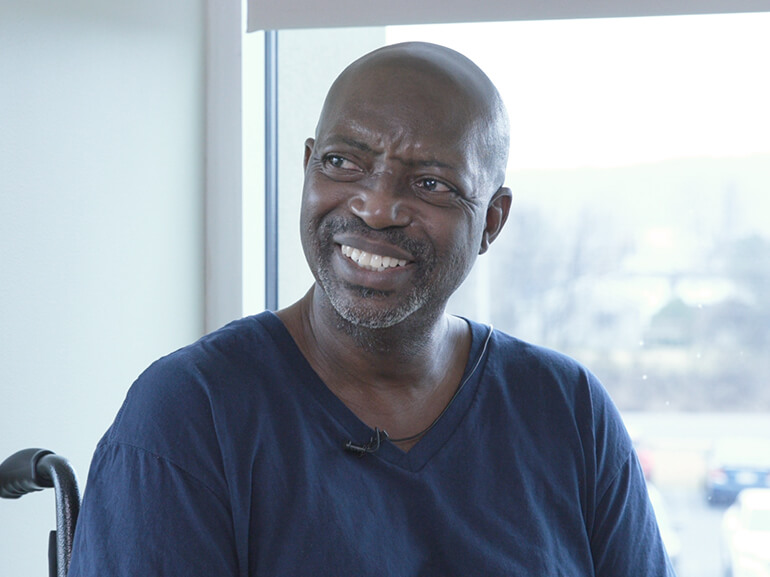Hudson's story

Hudson Gordon, 55, affectionately called “Tin Tin” by family and friends, lives in Antigua with his wife, Santa. They each have four children and a total of five grandchildren, and they share a love of animals including their nine cats, six dogs, six rabbits and three turtles. Hudson typically works in an office as a supervisor at Antigua Public Utilities Authority (APUA), however, when his team was short-staffed due to COVID-19, he was tapped to help in the field. While his crew was running wires to a house, a roll of fiber optic cables fell from 20 feet above and hit him on the head. Although he was wearing a safety helmet, the blunt force impact caused him to fall to the ground and when he tried to stand, he was unable to move his arms or legs. Hudson was immediately sent to the local
medical center and a neurosurgeon was flown in from Trinidad to evaluate his injuries. Hudson’s scan showed herniated discs in his cervical spine region. He immediately underwent surgery to remove the abnormal discs and fuse his cervical spine.
Nearly a week after surgery, Hudson was discharged home with home therapy services. Due to the limited resources where Hudson lives, an inpatient rehabilitation facility was not an option and Santa became his primary caretaker at home. Since Hudson was not progressing at home with the limited amount of therapy he was receiving, his co-worker and friend began researching rehabilitation facilities. He reached out to a physician friend who lived in Pennsylvania and recommended Penn State Health Rehabilitation Hospital. After weeks of coordinating with fellow medical advocates, Hudson was approved for air transport to continue his care in the United States. Hudson and Santa were a team throughout the entire recovery journey. She traveled with him and was there every step of the way. A designated advocate also traveled with the couple for support.
When initially admitted, Hudson required assistance with everything. His physical therapy team focused on sitting and standing using the tilt-in-space wheelchair and standing frame for support. They used the Functional Electrical Stimulation (FES) bike for his arms and legs to provide his muscles with additional stimulation during therapy, and he soon progressed to walking in the gym using the treadmill and the LiteGait bodyweight support system. Occupational therapy was able to assist Hudson with his first shower in months. Since he loves music and plays many instruments including piano, guitar and trombone, Hudson’s recreational therapists incorporated playing the piano in his therapy sessions.
After a few weeks at Penn State Health Rehabilitation Hospital, Hudson was discharged to a local hotel where he continued with the outpatient therapy day program. At this point, he was able to stand with help and required minimal assistance in his daily self-care tasks. His goal for the outpatient program was to progress to independently walking and managing his own self-care needs. During therapy, he had the opportunity to complete six gait training sessions in the EksoNR, a battery-powered bionic exoskeleton which helps re-teach the muscles to walk. A turning point in his recovery was the first time he was able to stand independently, an achievement that greatly motivated him.
After nearly two and a half months in the United States, Hudson was discharged from outpatient therapy and he and Santa returned home to Antigua. Hudson shared, “We met so many wonderful people, both staff and other patients, who we now consider friends. I am so grateful for the outstanding care and therapy I received at Penn State Health Rehabilitation Hospital.”